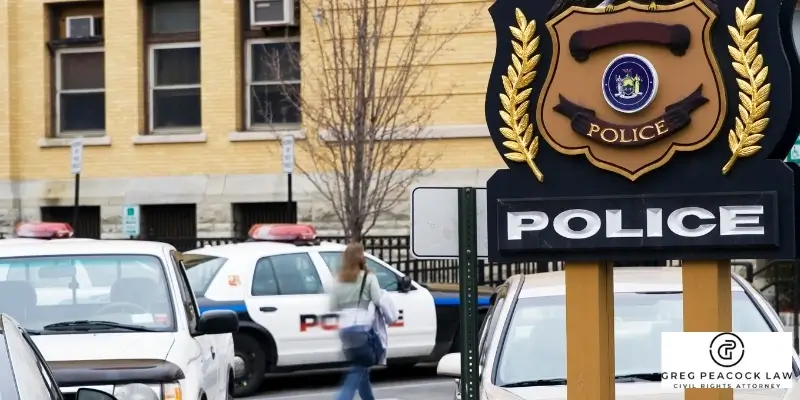|
|
Last Modified on Sep 04, 2025
When you are forced to interact with the police, you may feel somewhat unnerved or even terrified. It’s understandable to feel this way, especially if you have been a victim of police misconduct or brutality in the past, or know someone who has. It’s important that you recognize your rights as an American citizen and stand up for yourself when you should. You may be wondering, “What are your rights when dealing with police in California?” A lawyer can help.
The legal team at Greg Peacock Law can help you understand your constitutional rights when dealing with law enforcement. If the police try to infringe upon these rights in any way, you should contact a civil rights lawyer as soon as you can. The last thing you should ever feel is unsafe or in danger because you didn’t comply with a police officer’s orders. A good lawyer can help you hold them accountable for their actions.
What Are Your Rights When Dealing With Police in California?
Depending on how many interactions you have had with police in the past, you may not be fully aware of your rights as a citizen when it comes to being stopped by the police. If you are unaware of your rights, the police may try to use that to their advantage and manipulate you to some degree. In a 2023 incident report from the California Department of Justice, it was shown that over 650 civilians were involved in incidents of police brutality and excessive force that year.
If you are involved in an incident with the police that results in an injury, you may have been severely traumatized. It may be wise to look into local California support groups that can help you talk through your pain, such as NAMI Inland Valley or Sensible Care. Having someone to talk to about everything you’ve been through can be greatly beneficial to the healing process.
In California, when you are dealing with the police, you are afforded a number of constitutional rights that cannot be infringed upon. If any of them are infringed upon, you may have a considerable case for a civil rights lawyer to help you put together. It is vital to your case and your continued freedom that you understand your rights. Here are just a few of them that can be crucial to your dealings with law enforcement:
- Right to remain silent. You never have to speak to the police if you don’t want to. You are never obligated to answer any of their questions without your lawyer present. The only information you may be obligated to provide is your name and address. The police may try to guilt or intimidate you into incriminating yourself, but you don’t have to say a word to them.
- Right to legal counsel. The right to legal counsel ensures that anyone accused of a crime has access to an attorney to represent them in court, a principle rooted in fairness and due process. You always have the right to speak with an attorney and hire them to represent your interests in your case. You can allow them to speak on your behalf to the police.
- Right to refuse a search. Unless the police have probable cause that a crime is being committed or a legally-obtained search warrant, they have no right to search your home, your vehicle, or you. You are allowed to refuse a search. It might make you look guilty in their eyes, but it would be a violation of your rights to allow it. You are under no obligation to make their job easier.
- Right to record: Police officers may get belligerent and angry if they learn you are recording them, but it is perfectly legal to do so as long as you are not interfering with the performance of their duty.
FAQs
Can You Refuse to Show ID to the Police in California?
Yes, you can refuse to show ID to the police in California unless you are being lawfully detained or arrested. If you are pulled over, you are required to show them your driver’s license if they request it. Generally, you are not required to show your ID to the police, since California does not have a stop and identify statute. Some states do.
What Are Some Things Police Are Not Allowed to Do in California?
There are many different behaviors police are not allowed to engage in in California, but that unfortunately does not stop some officers. For example, if you are not being arrested, a police officer cannot take your phone. You have the right to record a police officer if you are not interfering with their job. If a cop takes your phone, they cannot delete or even look at videos or photos on it without a warrant.
What Are Your Civil Rights When Dealing with Police?
You are afforded many different civil rights when dealing with police. The police are not above the law. They cannot infringe upon your civil rights without serious legal consequences. These rights include your right to remain silent, your right to legal counsel, your right to record police interactions, and your right to refuse an illegal search. There are many others, but these are generally the most important when you are dealing with the police.
Can You Film the Police in California?
Yes, you are allowed to film the police in California, to an extent. You cannot directly interfere with the performance of their duties while filming, and you cannot do it secretly. The camera must be visible. In some cases, secretly filming or secretly recording a police officer may be considered a misdemeanor.
Reach Out to a Civil Rights Lawyer Today
Understanding and recognizing your constitutional rights is essential to your continued freedom. If you are unaware of your rights, the police may try to take advantage of you without your knowledge. If your rights have been denied or cast aside, you should reach out to an experienced civil rights lawyer for help in building a case.
The legal team at Greg Peacock Law can help you develop a strong case that protects your civil rights and holds the right people accountable. Contact us to set up a consultation.





